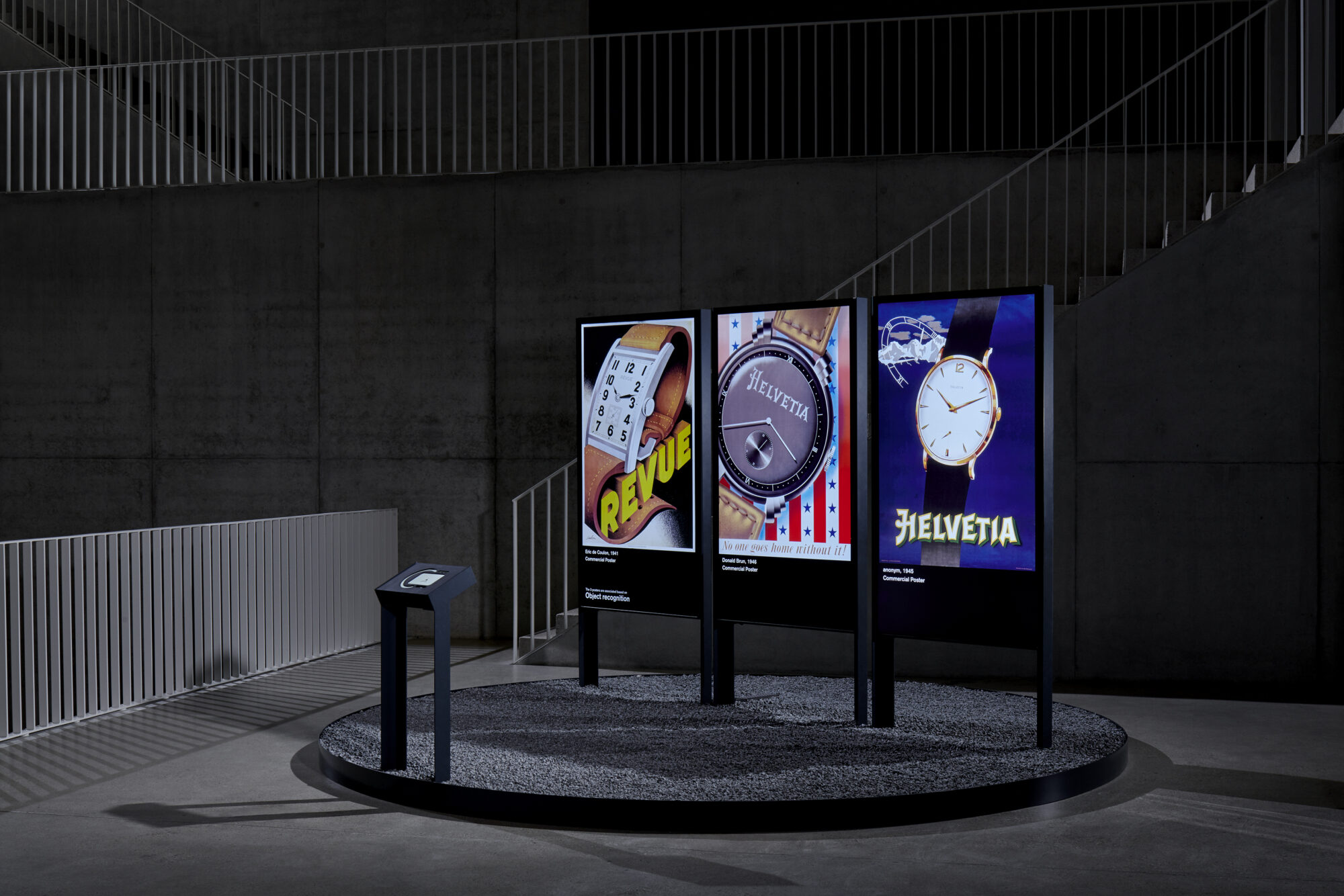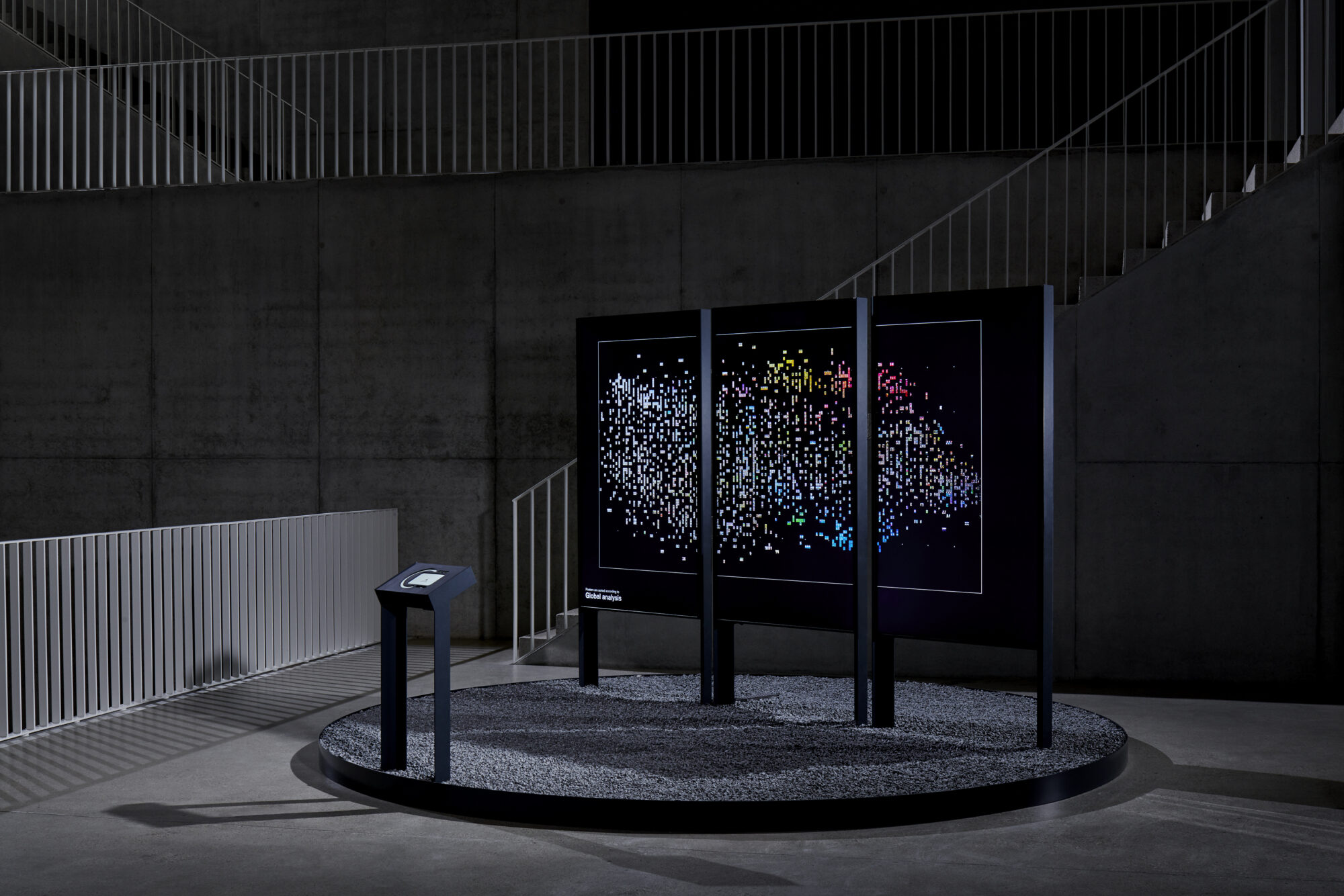Poster World uses metadata and artificial intelligence to express the richness of the poster as a medium. The selection includes some 2,000 posters that celebrate Swissness through Helvetic symbols, products, places, events, themes, personalities, and stylistic approaches
It is based on the rich archives of the Museum für Gestaltung Zürich, one of the most extensive and important collections worldwide. More than 380,000 political, commercial and cultural posters document the history of Swiss and international poster culture from its beginnings in the mid-19th century until today. Combining design research and artificial intelligence, the experimental approach led by the EPFL+ECAL Lab has made it possible to produce trios of posters based on visual similarities. These similarities highlight key features, which are then revealed by different graphics.
Poster World, EPFL+ECAL Lab, 2021 © Daniela Tonatiuh
Poster World is a research project carried out for more than two years by a team of designers, engineers and psychologists from the EPFL+ECAL Lab, the EPFL Design Research Centre, in collaboration with several scientific laboratories. It explores how emerging technologies and interaction design can enhance general interest in digitised cultural heritage. The resulting installation reveals to the public the main elements of the world–renowned Swiss graphic design.


Control panel, EPFL+ECAL Lab, 2021 © Daniela Tonatiuh
The poster is a fascinating graphic object because of its role in society and the complexity of its composition. Ubiquitous in our daily lives, it must catch our attention and deliver its message in a matter of seconds. It also combines many visual components where text and image are closely intertwined. A poster’s dominant colours, main composition lines, objects, typography, text positions and contrasts, are just some of the elements that influence its visual impact. With the use of different algorithms, and in particular artificial intelligence, Poster World reveals these dimensions to the public, allowing them to understand the poster’s graphical richness. The installation analyses the posters, extracts data and generates a new representation of the poster that visualizes a particular feature.

Poster World, EPFL+ECAL Lab, 2021 © Daniela Tonatiuh
Going even further, Poster World brings together similar posters on the basis of a chosen criterion. To confer cultural relevance on these connections, the EPFL teams trained artificial intelligence on associations produced by the Museum für Gestaltung Zürich, especially its books, rather than using the standard data and tools. They then tested the results with both designers and the general public.
The project also had the mission of emphasizing the relationship between each poster and the collection. The collection view rearranges according to the selected settings. The system designed by the EPFL+ECAL Lab makes it possible to quickly process other selections made by the curatorial team. With its ability to manage associations among several billion possibilities, Poster World doesn’t replace the curation work, but amplify and complement it, in order to enhance the museum's collection in an unprecedented way.
The installation has been the subject of studies on user perception following research protocols from psychology. The results show how digital technology can lead to gains in attractiveness and knowledge among the public. And that it is possible, with the same installation, to bring a significant impact to both novice and professional audiences.
EPFL+ECAL Lab:
Nicolas Henchoz, Direction
Andre Andrade, Research Assistant, MAS in Design Research for Digital Innovation
Lara Défayes, Art Direction & Project Management
Andre Andrade in cooperation with Lara Défayes, Interaction Design
Delphine Ribes, Yves Kalberer, Céline Dupuis, Lazar StojkovicCreative, Coding & Software Engineering
Béatrice Durandard, Industrial Design
Dr. Cédric Duchêne, Sound Design
Andreas Sonderegger and Andréa Schneider, UI/UX Psychology
Sofia Viola and Renée Favre, UX Research Assistants
Daniela & Tonatiuh / EPFL+ECAL Lab, Photography Credits
EPFL:
Mathieu Salzmann, Senior Scientist, CVLab
Frédéric Kaplan, Professor, DHLab
Valentine Bernasconi, Master thesis, Digital Humanities
Bastien Favre, Bachelor semester project, Computer Science
Syed Talal Wasim, Master thesis, Computer Vision
Museum für Gestaltung Zürich:
Christian Brändle, Director
Roman Aebersold, Deputy Director
Damian Fopp, Exhibition curator
Dr. Bettina Richter, Poster Collection curator
Judith Scheiber, IT project manager
Umberto Ramito, Photographer
Ivan Suta, Photographer
Maya Ellerkmann, Research assistant